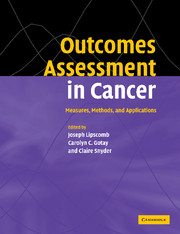Book contents
- Frontmatter
- Contents
- List of contributors
- Acknowledgments
- 1 Introduction to Outcomes Assessment in Cancer
- Health-related quality of life in cancer: general concepts and generic measures
- Assessing health-related quality of life during treatment
- 5 Quality of life in breast cancer: what have we learned and where do we go from here?
- 6 Measuring quality of life in prostate cancer: progress and challenges
- 7 The science of quality-of-life measurement in lung cancer
- 8 Treatment for colorectal cancer: impact on health-related quality of life
- 9 Instruments to measure the specific health impact of surgery, radiation, and chemotherapy on cancer patients
- Assessing health-related quality of life across the cancer continuum
- Measuring the experience and needs of cancer patients and caregivers
- Methodological considerations in applications to cancer outcomes research
- Modern psychometric theory in cancer outcomes research
- Assessing the economic impact of cancer
- Research and policy implications
- Invited papers
- Index
- References
8 - Treatment for colorectal cancer: impact on health-related quality of life
Published online by Cambridge University Press: 18 December 2009
- Frontmatter
- Contents
- List of contributors
- Acknowledgments
- 1 Introduction to Outcomes Assessment in Cancer
- Health-related quality of life in cancer: general concepts and generic measures
- Assessing health-related quality of life during treatment
- 5 Quality of life in breast cancer: what have we learned and where do we go from here?
- 6 Measuring quality of life in prostate cancer: progress and challenges
- 7 The science of quality-of-life measurement in lung cancer
- 8 Treatment for colorectal cancer: impact on health-related quality of life
- 9 Instruments to measure the specific health impact of surgery, radiation, and chemotherapy on cancer patients
- Assessing health-related quality of life across the cancer continuum
- Measuring the experience and needs of cancer patients and caregivers
- Methodological considerations in applications to cancer outcomes research
- Modern psychometric theory in cancer outcomes research
- Assessing the economic impact of cancer
- Research and policy implications
- Invited papers
- Index
- References
Summary
Introduction
Colorectal cancer (CRC) is the second leading cause of cancer death in the US each year. It is estimated that in 2002 there were 148 300 new cases and 56 600 deaths from CRC. Direct evidence from randomized trials and indirect evidence from case-control and cohort studies– suggest that screening affects 5-year survival. Specifically, screening can identify pre-cancerous lesions and prevent development of CRC or identify CRC in earlier stages (I and II) when it can be treated more effectively. The relative 5-year survival rates for early-stage disease (I and II) and advanced disease have been estimated at 65%–90% and 9%, respectively. Because most patients diagnosed with CRC have not undergone screening, most CRCs are diagnosed after local or regional spread, and nearly half of all patients so diagnosed will die from it.
Treatment for CRC is based on the stage and location of disease and includes surgery, chemotherapy, and/or radiation therapy. These modalities may be associated with substantial toxicity, including hair loss, profound nausea and vomiting, and fecal incontinence. Furthermore, therapy for CRC may result in the formation of a permanent or temporary stoma. All of these treatments may have side effects that have an important effect on health-related quality of life (HRQOL).
Treatment for colon cancer includes surgical resection for stage I and II disease, and surgery plus chemotherapy for stage III and selected patients with stage IV disease. Palliative care is provided to patients with unresectable disease.
- Type
- Chapter
- Information
- Outcomes Assessment in CancerMeasures, Methods and Applications, pp. 178 - 200Publisher: Cambridge University PressPrint publication year: 2004
References
- 1
- Cited by



